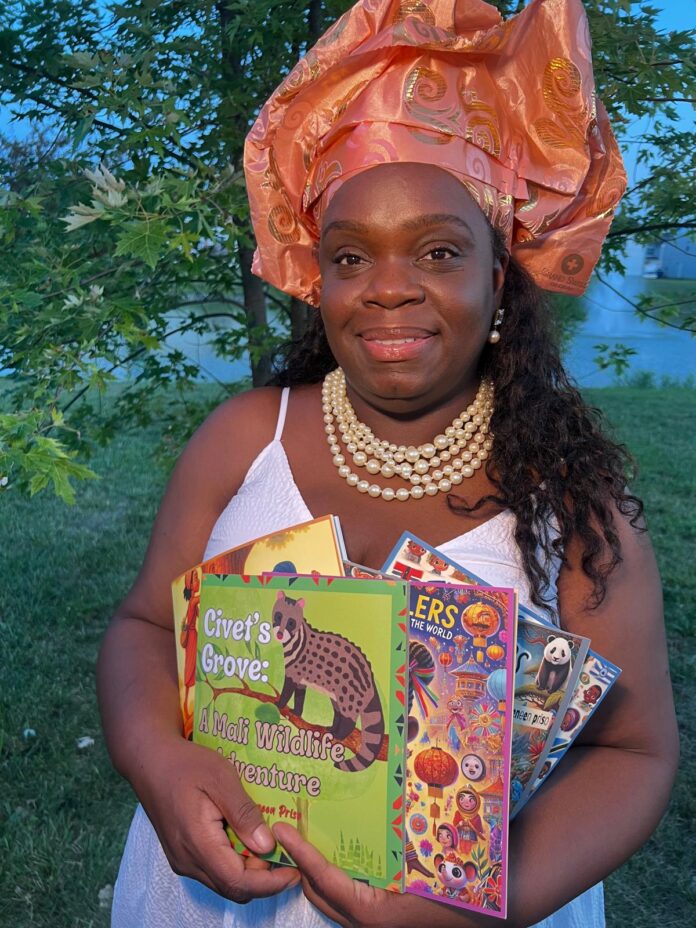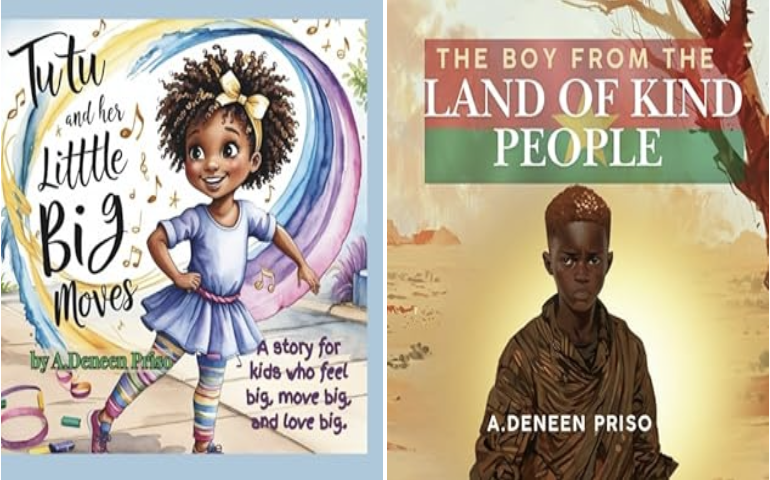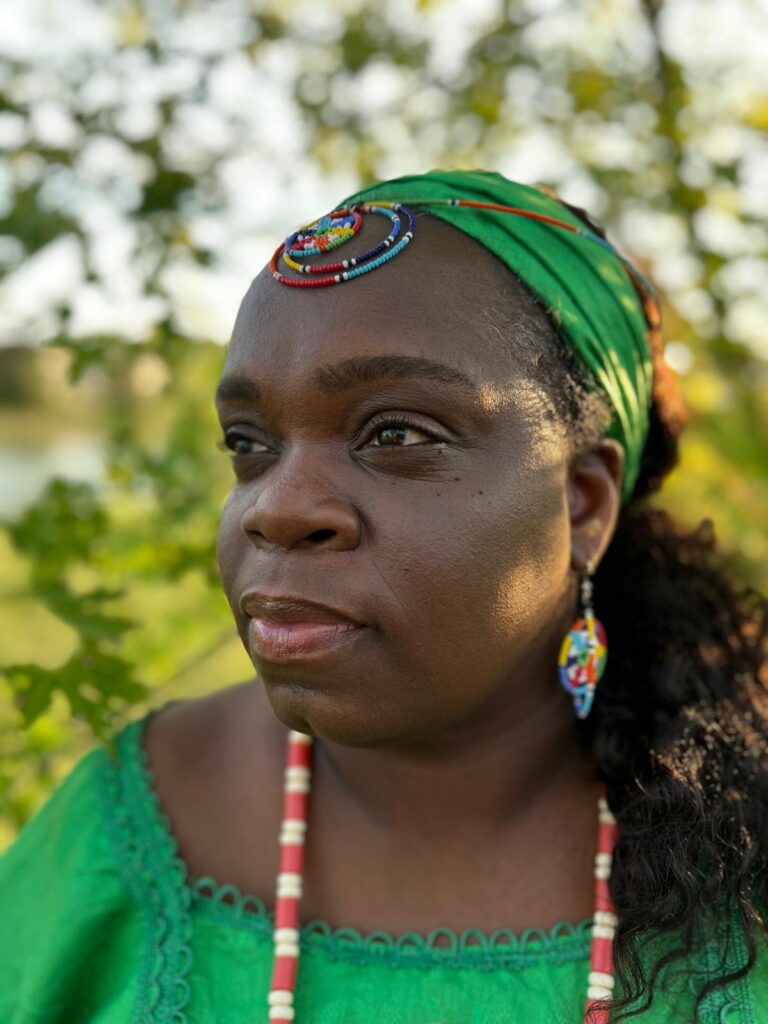In a world where children’s literature too often omits the fullness of Black and African identity, Roots & Rhythms Stories emerges as both a cultural balm and a creative revolution. At the heart of this movement is Angela Deneen Priso, a visionary author, cultural curator, and storyteller who transforms ancestral memory into lyrical narratives that center joy, identity, and belonging. Born from a personal journey of reconnection and discovery, her platform offers more than just stories; it’s a vibrant space where children of the African diaspora can see themselves reflected with pride, curiosity, and power.
Guided by the rhythms of oral tradition, the heartbeat of West African culture, and a fierce belief in the value of every child’s narrative, Priso uses storytelling not only as a form of preservation but as a liberating tool of possibility.
In this exclusive interview with The Network Journal, she opens up about the genesis of her work, the impact of representation, and her vision for a future where all children are empowered to be the heroes of their own stories.
TNJ: What inspired the creation of Roots & Rhythms Stories?
Priso: Roots & Rhythms Stories was born from a blend of longing, identity, and imagination. As an African American child, I always felt a deep, unshakable curiosity about Africa—not just as a place on the map, but also as something deeply spiritual. I would dream about it. In those dreams, I spoke languages I didn’t know and was still understood. I imagined people who looked like me—dark-skinned, strong, beautiful—waiting with open arms. When I finally visited Africa as an adult, it was both magical and sobering. I saw beauty, brilliance, and the ongoing impact of post-colonial struggles. Simultaneously, I noticed a similar disconnection here in America—especially among Black children who don’t always see themselves reflected in joy or global narratives. That’s when it hit me: there’s a gap, and maybe I could help bridge it.
TNJ: How did your personal heritage shape its development?
Priso: My DNA says I’m 87 percent Cameroonian and Nigerian, but I wasn’t raised with those traditions. Still, I chose to honor them through storytelling. Roots & Rhythms became my way of stitching together what history tried to tear apart. It’s a platform where African and diasporic children can find themselves in lyrical stories, playful language, rich visuals—and most importantly, possibility.
TNJ: How do you choose which stories to tell?
Priso: I choose stories based on what I feel is missing—not just from bookshelves, but also from the emotional lives of children. I ask myself: what haven’t they seen or heard about themselves? What parts of their identity deserve more joy, more magic, more depth? I’m drawn to stories that center Black and African children in wonder—not in trauma. I’m not here to re-teach pain. I’m here to plant something softer, stronger, and imaginative. Sometimes that means reimagining African folklore with a lyrical twist. Other times, it means introducing real-world figures like [Burkina Faso President] Ibrahim Traoré in ways young readers can connect with.
TNJ: What themes are most important for you to highlight in your work?
Priso: The themes I return to most are curiosity, cultural pride, rhythm, resilience, and the beauty of everyday life. If a story helps a child feel powerful—or even just peaceful—then I know it’s worth telling.
TNJ: What do you hope children and families take away from engaging with Roots & Rhythms Stories?
Priso: I want children to feel seen, connected, and inspired. I want Roots & Rhythms to be a place where they find joy in who they are and curiosity about the world around them—especially if they’ve never seen themselves centered in a story before. I want them to laugh, wonder, dream, and feel like the rhythm of their identity matters. For families, I hope my books and videos create meaningful moments—reading together at bedtime, dancing to a song, or having conversations that wouldn’t have happened otherwise. I want them to feel pride in the cultures represented, and openness to those they’re just discovering. Ultimately, Roots & Rhythms is about legacy, belonging, and helping children grow up knowing they have value, voice, and a place in the global story.
TNJ: How do you approach storytelling as both an educational tool and a form of cultural preservation?
Priso: Storytelling, for me, lives at the intersection of learning and remembering. When I write, I’m not just entertaining—I’m inviting children into a world where they can learn something new and feel something ancient. Whether it’s a bilingual phrase, a Cameroonian landscape, or a subtle cultural gesture—these details educate without lecturing and preserve without preaching. My goal isn’t to teach lessons in the traditional sense; it’s to build familiarity—to make African and diasporic cultures feel accessible, beautiful, and alive. That’s the educational part. And by incorporating folklore, rhythm, language, and values, I’m also preserving what deserves to be passed on.
TNJ: Share a moment when a reader or parent told you how your stories impacted them or their child?
Priso: A sorority sister once told me that the characters in my books—beautiful brown children with bright eyes, braids, and ribbons—reminded her to be the main character in her own story. Not just on paper, but in life. Another friend shared that watching me unapologetically center Black children in joy and beauty made her reflect on how often she’d dimmed herself to fit in. That conversation wasn’t even about her child—it was about her own identity. That’s when I realized the ripple effect of storytelling. Yes, these stories are for children—but they also awaken something in adults. They give people permission to show up fully, to reclaim their place, and to be seen.
TNJ: How do rhythm, music, and oral tradition influence the way you present your stories?
Priso: Rhythm is in the bones of everything I create. It’s not just a style—it’s cultural memory. Our ancestors passed down knowledge through rhythm long before anything was written down. I lean into that when I write—whether through repetition, rhyme, or lyrical phrasing that feels like a familiar song. That rhythm shapes not only my content but also my delivery. That’s why Roots & Rhythms has expanded into video and sound. Some stories want to be read aloud. Some want to be danced to. I let the story tell me how it wants to live. Oral storytelling isn’t a lost art—it’s a living one. It helps me connect with children who may not yet love books, and honors the traditions that shaped me.
TNJ: What role does identity play in your narratives, especially for children of the African diaspora?
Priso: Identity is central to everything I write. I don’t write to explain identity to children of the African diaspora. I write to affirm it. To normalize it. To celebrate it. My characters don’t justify who they are—they simply exist: fully and beautifully. With names that reflect their heritage, hair that defies gravity, and joy that isn’t tied to struggle.
For generations, identity was something we had to defend. I want this generation to start from a place of knowing. Knowing they belong. Knowing their culture is worthy. Knowing they can be the main character—not just in fiction, but in real life.
TNJ: How has your background as a Cameroonian woman informed the values and messages in your work?
Priso: While I wasn’t raised in Cameroon, learning that 87 percent of my ancestry is Cameroonian and Nigerian felt like a calling. I don’t claim Cameroonian womanhood by tradition, but I claim it through reverence, curiosity, and intention. That connection has shaped the values I infuse into my work: pride in our roots, reverence for elders and ancestors, and a deep belief that children are sacred storytellers in the making. Even when my books are lighthearted, they carry the weight of that rootedness.
TNJ: What challenges do you face as an author and cultural storyteller?
Priso: One major challenge is visibility. The market is crowded, and culturally specific stories—especially those told in nontraditional, lyrical, or bilingual formats—are often overlooked. Another challenge is balancing authenticity with accessibility. I want to stay true to the cultures I represent while making all children feel welcome. And of course, building this without a major team or funding has been hard. Roots & Rhythms is grassroots. Self-built. Sometimes messy. Always full of heart.
TNJ: What keeps you going in spite of the challenges?
Priso: What keeps me going is the feedback. The teacher using my book in class. The parent whose child saw herself or himself for the first time. The friend who said, “This reminded me to be the main character in my life.”
TNJ: How do you see Roots & Rhythms Stories evolving in the future?
Priso: Roots & Rhythms was never meant to stay confined to books. We’ve already begun experimenting with videos, music, and bilingual storytelling on YouTube.
I envision creative workshops that help children become their own storytellers, educator toolkits, and collaborations with artists and educators. I especially want to reach children who don’t see themselves as “readers” but thrive through sound, visuals, and movement.
Whether it’s a storytelling circle, music experience, or cultural festival, I want Roots & Rhythms to meet children where they are and invite them in.
TNJ: How important is it for children to see characters who look like them and share their cultural experiences?
Priso: It’s everything. When children see themselves in stories—their names, skin, rhythms, languages—they stop asking, “Do I belong here?” and start saying, “This belongs to me.” Representation builds confidence. It affirms identity. For children of the African diaspora, who often have to defend or discover their identity, it’s especially critical. Roots & Rhythms is here to offer not just mirrors, but also windows and open doors.
TNJ: What would you advise aspiring writers who want to tell stories rooted in culture and tradition?
Priso: First, honor the culture. Don’t start with the trend—start with the truth. Whether it’s your own culture or one you’re engaging with, approach it with care, curiosity, and deep listening. Second, write with joy and courage. There’s this pressure to write heavy, trauma-centered stories—but don’t be afraid to write ones that sing. That celebrate. That spark pride and laughter. And finally, be patient. The world might not get it right away, but that doesn’t mean it’s not needed. Stay rooted. Stay curious. Keep writing what feels true.










